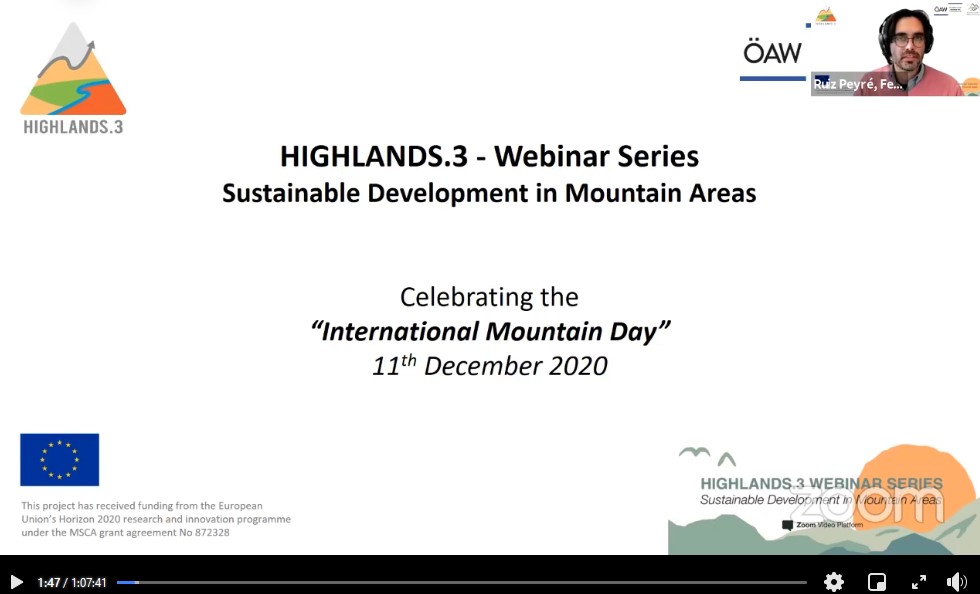H3-Second R&IS Alps (September - October 2022)
The Session was an international joint activity organized in cooperation by the Austrian Academy of Sciences (OeAW), the University of Innsbruck and the Regionalplanungs-gemeinschaft Grosses Walsertal, all in Austria, the University of Bern in Switzerland, the University of Padua and the Bersntoler Kulturinstitut, both in Italy, and the Agricultural Institute of Slovenia and the Soča Valley Development Centre, both in Slovenia. The session gathered about 40 participants (scientists and practitioners) from 15 different countries.
The session started with networking activities parallel to the International Mountain Conference, held in Innsbruck in these days. H3 researchers organised 12 sessions and made more than 20 presentations during the Conference.
During the second week, an exchange with students of the master degree course in Geography (University of Innsbruck) was organised. H3 researchers interacted with master students in the conduction of joint field research and gave advice in methodological and theoretical aspects related to interdisciplinary research on sustainable development.
This was followed by the visit to around 45 Initiatives for Sustainable Development in Highlands (ISDH) in small groups, going to the western Austrian Alps, Italian Alps, French Alps and Slovenian Alps. The focus of the ISDH was on socio-environmental transition, food production and nature conservation, among others.
H3-Eighth and final R&IS in Spain/Portugal
The final Session began in Galicia, Spain, with fieldwork in and around Monte Pindo, Trevinca, and Santiago de Compostela. Together with local communities, researchers, and policy actors, we examined territorial dynamics and collaborative knowledge production in mountain regions. Since early July, the work has continued in Geopark Tomar and Serra da Estrela, Portugal, where the last research activities and exchanges are taking place. 27 participants from 14 countries took part in the activities.
The session included a seminar in Tomar and concluded with the project’s Final Meeting in Serra da Estrela, attended by representatives of thirty-five partner institutions. This final session consolidated the scientific and institutional achievements of the R&IS cycle and reinforced the collaborative network established throughout the project. From the Alps to the Andes, mountain regions in Malawi and Vietnam, from the Carpathians to the Pyrenees, HIGHLANDS.3 has demonstrated how mountain regions and local Initiatives can serve as key spaces for rethinking sustainability, governance, and resilience in times of social-ecological transformation.
You can watch the recording of the Final Meeting here (Starts at about 18:20min into the video).
We are very excited to continue this research in the follow-up project.
H3-Seventh R&IS Vietnam (March 2025)
In March 2025, a total of 15 researcher from 9 different countries joined on the seventh R&IS of the Highlands.3 project in Vietnam. The Session was organized in cooperation with the National Institute of Animal Sciences (NIAS) in Vietnam.
For that, two researchers from NIAS conducted individual Secondments for about 2 months in Austria in Autumn 2024, to plan the Session with the Coordinators of the H.3 project. This gave us the possibility to plan the R&IS intensely and work on a schedule, that would fit everybody and would cover multiple areas in Vietnam.
We started on the 3rd of March, after everybody arrived in Hanoi with the opening ceremony at NIAS, where the participants learned about the principles of the Highlands project and got an introduction about the country, the region and what to expect in the following weeks.
Two days later, we flew from Hanoi to Dien Bien, the region where the first Initiatives would be visited. In Dien Bien, we also met with the Department of Agriculture and Environment, to learn more about the agricultural sector and share our experiences of the H.3 project.
In the following 2 weeks, multiple Initiatives of the Dien Bien region were visited. In this Session we collected data from a total of 19 Initiatives, which will soon be added to the ISDH Platform (access here)!
The group returened to Hanoi on the 20th of March by bus, where it was ended with discussions and the Closing Meeting on the 26th of March.
We thank everybody who helped organizing the Session in this beautiful country and are motivated for the last R&IS of the project, which will be conducted in June-July 2025 in Spain/Portugal!
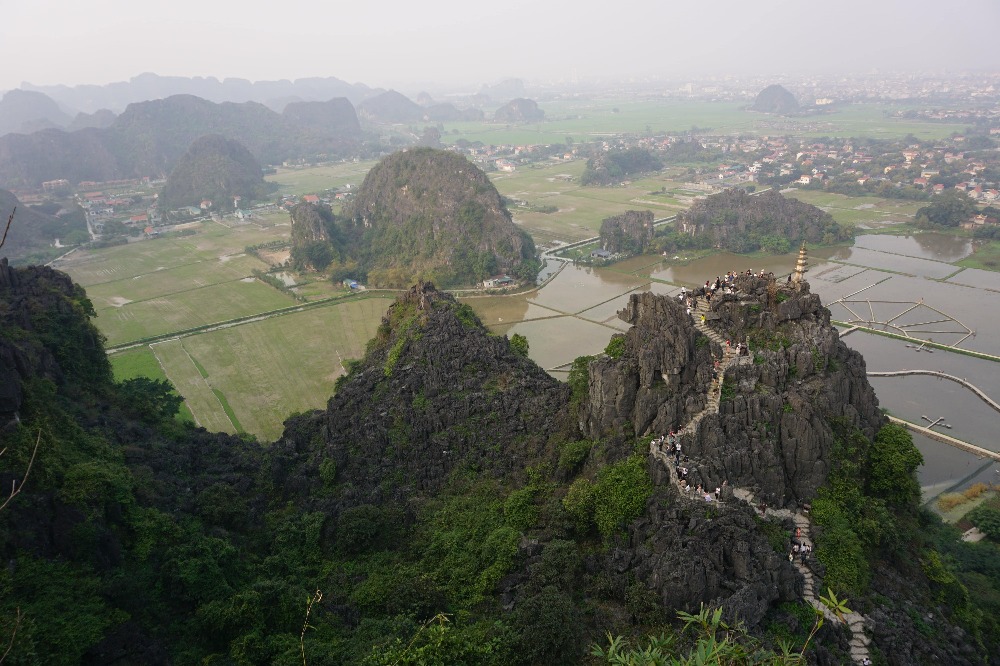
H3-Sixth R&IS Cape Verde (November 2024)
The sixth Research and Innovation Session was conducted in Cape Verde in November 2024. A total of 22 researchers joined the Session on these beautiful islands in the Atlantic Ocean. This makes, after Malawi, the second Session which was conducted on African soil.
Fieldwork was conducted on the two most mountainous islands of the archipelago, addressing topics related to sustainability, natural resource management, and climate adaptation in island contexts. The group contained of people from 10 different countries, including two researchers from outside Europe (Argentinia & USA). They visited 15 ISDHs and, following the previous Sessions, conducted interviews with representatives of the respective Initiatives. You can see results of these Sessions in the ISDH Platform, which you can access here.
The session expanded the project’s geographical and thematic scope to Atlantic territories and strengthened partnerships with African and Portuguese-speaking research networks. We were greatly supported by the local staff of the Universidade de Cabo Verde! Thank you again for this great experience.
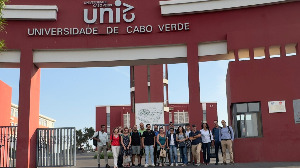
H3-Fifth R&IS Malawi (February - March 2024)
The fifth Research and Innovation Session took place in Malawi. This makes it the second R&IS, that took place outside of Europe, after the Session in the Argentinian Andes in February-March 2023. It was held for 4 weeks, from February to March 2024. The hosting institution, the Lilongwe University of Agriculture and Natural Ressources (LUANAR), welcomed 13 participants from 8 different countries, Austria, Switzerland, Poland, Slovenia, Germany, Italy, Norway and the USA. Besides the external participants, there was a strong support from staff and students from LUANAR. Altogether, 22 motivated local Malawians helped a lot with organizing and supporting the session, while it was ongoing. The session was organized in cooperation with the Norwegian University of Life Sciences (NMBU) and the projects Transform and FoodMa.
They worked side by side with us and joined at the total of 40 initiatives that were visited and interviewed in a total of 4 different Districts, from which 3 are in the Central Region, and 1 in the Northern Region of Malawi. The session started in Lilongwe with the opening meeting of all participants at LUANAR. Accomodated in Lilongwe, the capital of Malawi, we visited initiatives around the Districts of Mchinji and Dowa, which are accessible from the capital within one day. After travelling north to the city Mzuzu, we visited Initiatives in the District of Rumphi, before travelling back to Lilongwe.
There, we finished the session with a 2-day conference at LUANAR, with stakeholders, researchers and students.
.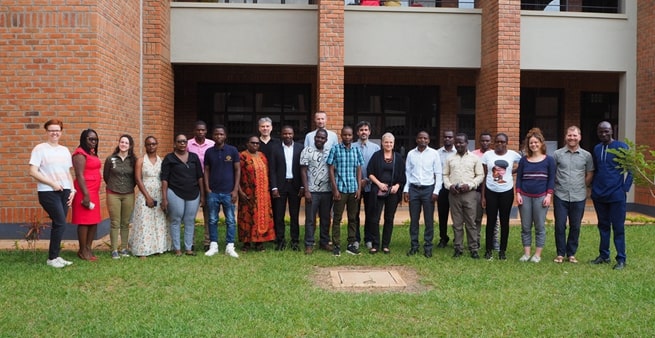
H3-Fourth R&IS Romania/Greece (September - October, 2023)
ROMANIAN PART
The first of the two parts of the fourth H3 R&IS took place in Romania, in the Capathian Mountains from September 7th to 21st in 2023. A total of 23 people took part in the first stop of the session, including 10 Romanian members and 13 participants from 10 different countries. The participants came from Europe (Austria, France, Norway, Slovenia and Spain), Africa (Algeria and Ethiopia), South America (Argentina), North America (USA) and Asia (Vietnam). A large proportion of the participants were geographers and animal scientists.
The main focus area of the Romanian part was the Capathian Mountains, of which around 60% are located in Romania. We interviewed a total of 17 different initiatives, with the selection process based on representativeness, diversity and availability.
The interviewees were:
- Dairy farming (some practicing transhumance on mountain alpine pastures)
- Fish Farm
- Land of Huts, which is an initiative to save the old shepherd huts
- Tourist Guesthouses
- Workshop for making and selling traditional costumes
- A town museum
- Bear sanctuary
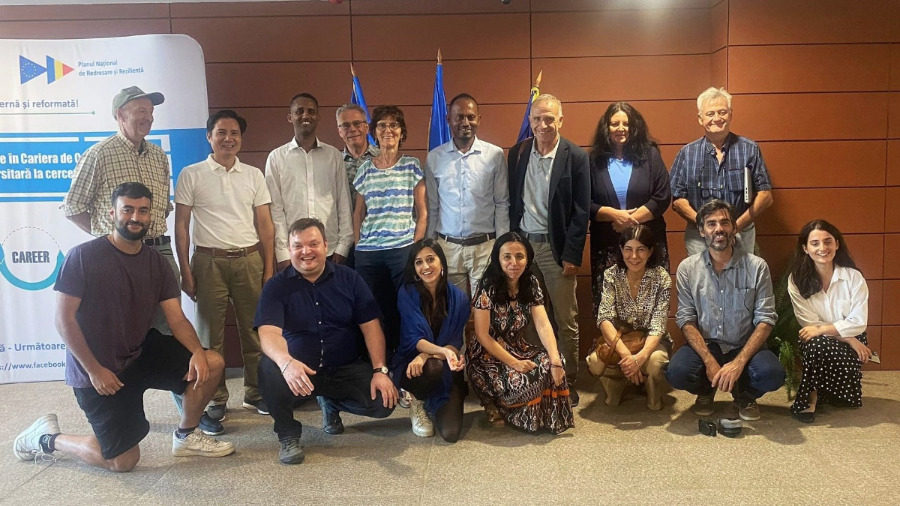
____________________________________________________________________________________________________________
GREEK PART
The second part of the fourth Research and Innovation Session took place in Greece, and started only a couple of days after the Romanian Part ended, from 25th of September until the 6th of October in Metsovo.
The Greek Part of the session was hosted by Terra Thessalia, which is a spin-off company with the purpose of cooperating with the small-scale dairy farms of Thessaly to preserve and highlight the traditions and quality characteristics of their products.
The group consisted of 13 people, some of them, who already conducted in the Romanian part and some others, who joined only for the greek part.
They visited a total of 13 initiatives, which were all located around the area of Metsovo and Joannina, in the North-Western part of Greece.
However, the content of the initiatives differed greatly from one another. The only thing they had in common was their direct and strong relationship with mountain regions.
The main aims of the initiatives were:
- Connection to conservation of natural and cultural heritage.
- Reoccupation of the abandoned mountain areas
- Highlighting the alive side of the mountains and the staying of young people
- Raising a barrier to climate crisis and its effects
- Producing high quality products
- Reviving the old techniques and their ancestral crafts
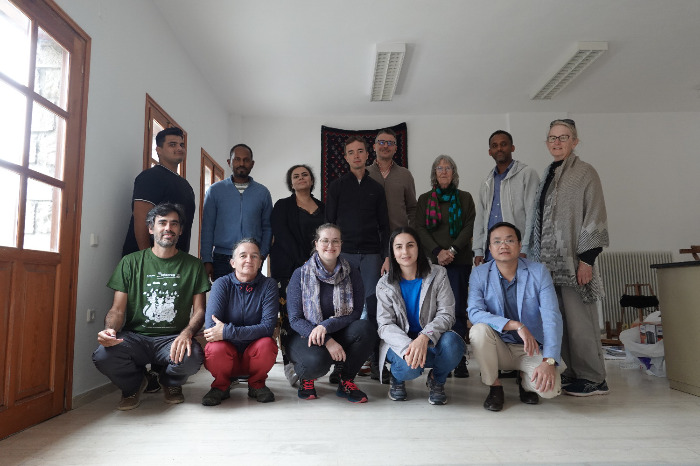
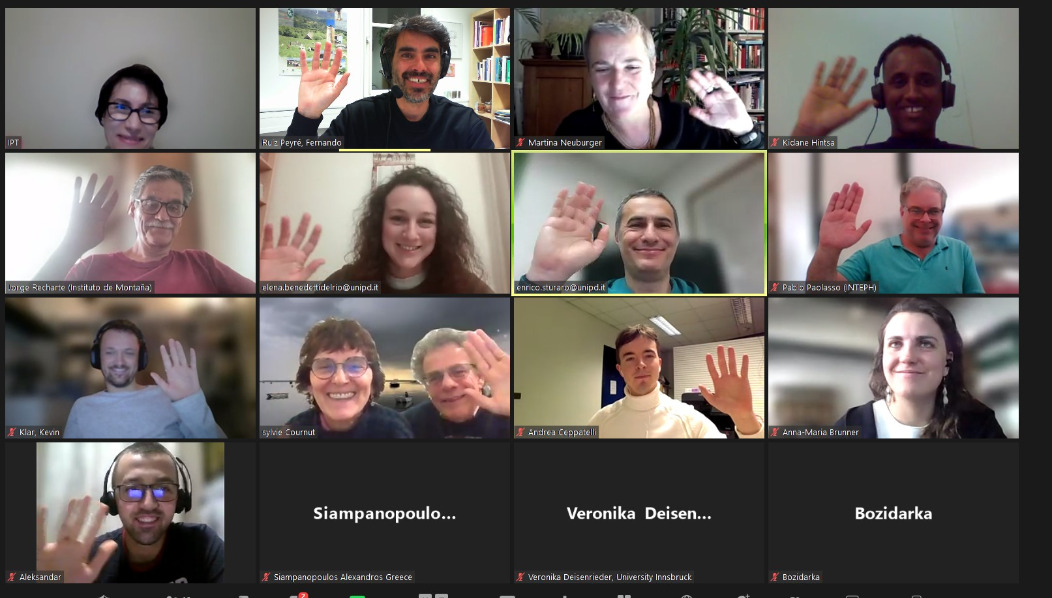
H3-Workshop Series 2023/2024
The Workshop Series 23/24 consisted of 5 individual Workshops, which focused on different aims.
We kicked it off on the International Day of Mountains, the 11th of December 2023, with a very nice presentation of António Abreu (Director of the Division of Ecological and Earth Sciences at UNESCO) from Portugal. We then got some impressions from the R&IS in Romania/Greece from Débora Cerutti, Valentina Stoica, Alexandros Siampanopoulos and Andrea Ceppatelli
The 2nd and 3rd Workshop of the WS 23/24, in January and February 2024, were all about Secondment Experiences and Good Practices. We therefore got different impressions from various Secondments.
The presenters were:
January 2024 - Secondment Experiences and Good Practices
Asja Gollo (University of Innsbruck)
Maria Sol Trad (CONICET)
Jean-Francois Tourrand (TLS)
February 2024 - Secondment Experiences and Good Practices
Martina Neuburger (University of Hamburg)
Hermínia Sol (Instituto Politécnico de Tomar)
Elena Benedetti Del Rio (University of Padua)
April 2024 - Reports on the Research and Innovation Session Malawi (February-March 2024)
Program and activities, Methodology and field work, Main Findings, Impressions and Personal Statements
Presented by participants of the session
September 2024 - Secondment Experiences and Good Practices
Lynda Allouche (Universite Ferhat Abbas Setif 1)
Juan Cruz Ghilardi (CONICET)
Alexandros Siampanopoulos (Terra Thessalia)
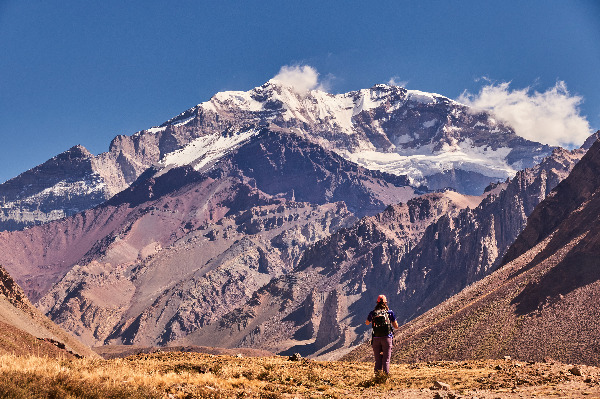
H3-Third R&IS Andes (February - March, 2023)
On the 15th of February 2023 the third Research and Innovation Session of the MSCA-H2020-RISE project HIGHLANDS.3 took place in the Argentinian Andes. We are pleased about the active participation of about 50 participants from a total of 11 countries, around half of whom came from european countries.
The program started in the south of Argentina in Patagonia, more precisely in Calafate, Santa Cruz. The R&IS was planned in such a way that three important regions of Argentina could be visited within the four weeks. The start in Patagonia was followed by the Central Andes in the region around the city of Mendoza. The third and last stop took place in the northwest, the Valles Calchaquíes, Tucumán.
The division of the session into three stops allowed to cover the diversity of the Argentine Andes. Thus, the imposing beauty of the Patagonian mountain ranges could be admired, the vitality of the Mendoza region, with its vineyards, the arid Andes and its innovative society and finally the socio-cultural, economic and scienic variety of the Valles Calchaquíes.
A total of 55 initiatives contributing to sustainable development at local or supra-regional level were visited and interviewed. As in the two previous sessions, there was a wide diversity in the initiatives and the research fields in which the participating scientists are active. This resulted in a very transdisciplinary form of research, broadening the own scientific horizon and gaining valuable experience for all involved.
The very successful session in Argentina, which was, in comparison to the rather difficult start of the project, less influenced by the Corona pandemic, motivates for the upcoming Research & Innovation Sessions within the Highlands.3 project.
Highlands.3 – Kick-off meeting in Brussels (February 10th, 2020)
On February 10th, the official Kick-off Meeting of Highlands.3 took place in Brussels (Belgium). The meeting have addressed the main aspects to consider by the partners for the correct development of the activities. Representatives of 27 institutions from 14 different countries involved in the project attended the conferences.
This journey consisted of four blocks of content. The first block, moderated by Fernando Ruiz Peyré (IGF/ÖAW), was an introduction between different participants, giving the opportunity to a first exchange of profiles and perspectives that are part of the project. In a second session led by Oscar Pérez Punzano (Project Officer), the RISE rules and the implementation of the project were addressed, with a round of interventions to clarify doubts. Before lunch break, Bedanna Bapuly and Barbara Hoflehner (OÄW) presented details regarding the Consortium Agreement, Ethics & Data Protection, audits, record keeping and other financial aspects
Last session occupied the entire afternoon. It consisted of two presentations on the development of the project activities as a whole and in the first R&IS, respectively. The first presentation was offered by Fernando Ruiz Peyré, and detailed some Governing Mechanisms, division into Work Packages and how to prepare Secondment Plans. To conclude the journey, Jean-François Tourrand (TLS) advanced the main contents of the first R&IS that will take place in the French Massif Central and invited a broad participation of all partners.
H3-Webinar Series - Session 1
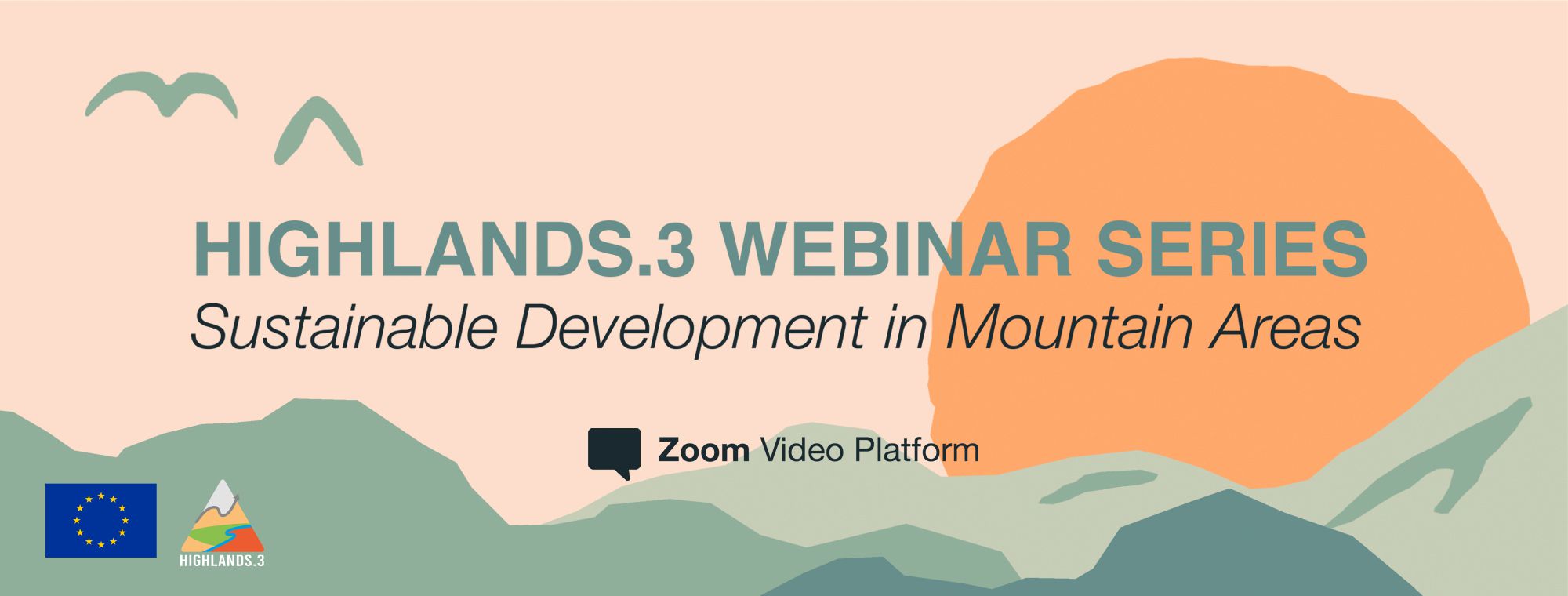
H3 Webinar series: Sustainable Development in Mountain Areas
Opening Session: "International Mountain Day"
11/12/2020, 12:00 (UTC/GMT)
Program
12.00 - Opening words
Fernando Ruiz Peyré (Austrian Academy of Sciences, AT) and Emanuel de Castro (Geopark Estrela, PT)
12:05 - HIGHLANDS.3 – Project description, goals, and activities
Fernando Ruiz Peyré (Austrian Academy of Sciences, AT)
12:15 - Keynote: “International Mountain Day and Highlands.3”
Susanne Wymann von Dach (University of Bern, CH) ↗Presentation (PDF)
12:30 - Introducing the network
Several members of the team introduce itself
12:45 - Presentation of the H3-Webinar Series: “Sustainable Development in Mountain Areas”
Emanuel de Castro (Geopark Estrela, PT)
12:55 - Q&A
13:00 - End of the Webinar
Moderation: Fernando Ruiz Peyré
Link to facebook live:
Hier can you see the webinar again
![]() https://www.facebook.com/RISEHighlands.3/videos/3505304449534756
https://www.facebook.com/RISEHighlands.3/videos/3505304449534756
Follow us in the social media.
https://www.facebook.com/RISEHighlands.3/
https://twitter.com/Highlands_3
https://www.instagram.com/highlands.3/


